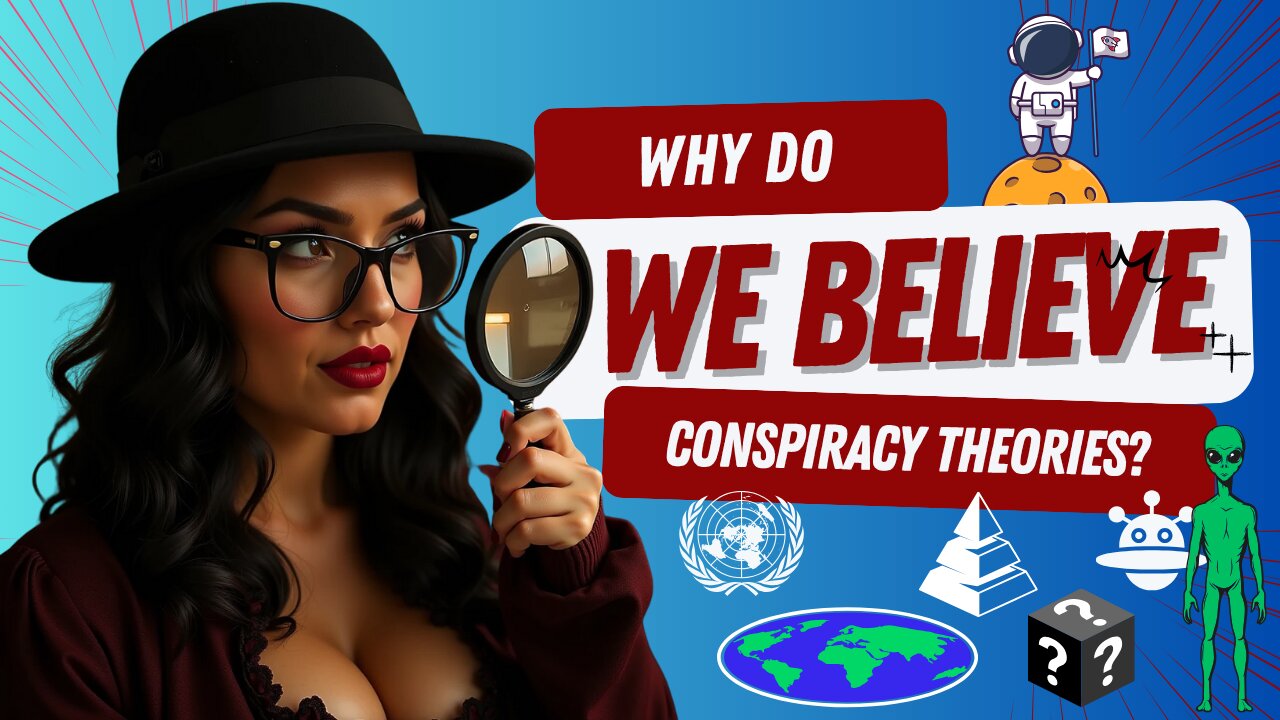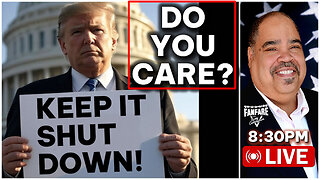Premium Only Content

𝗪𝗵𝘆 𝗗𝗼 𝗪𝗲 𝗕𝗲𝗹𝗶𝗲𝘃𝗲 𝗖𝗼𝗻𝘀𝗽𝗶𝗿𝗮𝗰𝘆 𝗧𝗵𝗲𝗼𝗿𝗶𝗲𝘀? 𝘈𝘯𝘥 3 𝘞𝘢𝘺𝘴 𝘵𝘰 𝘖𝘷𝘦𝘳𝘤𝘰𝘮𝘦 𝘠𝘰𝘶𝘳 𝘉𝘪𝘢𝘴
Why do we fall for conspiracy theories—even the wild ones? Turns out, our brains are wired to crave patterns, control, and the thrill of "secret knowledge." From seeing connections that don’t exist to trusting vague claims about "them," psychology reveals why these stories feel so convincing—and why 60% of people globally believe at least one. In this episode of Curious with Clara, we unpack the science behind conspiracy thinking and how to spot your own biases. Stay skeptical, stay curious!
𝗛𝗲𝗿𝗲 𝗮𝗿𝗲 𝘁𝗵𝗲 𝟯 𝗯𝗲𝘀𝘁 𝘁𝗼𝗼𝗹𝘀 𝘁𝗼 𝘁𝗵𝗶𝗻𝗸 𝘀𝗺𝗮𝗿𝘁𝗲𝗿—𝗻𝗼𝘁 𝗵𝗮𝗿𝗱𝗲𝗿—𝗮𝗯𝗼𝘂𝘁 𝗰𝗼𝗻𝘀𝗽𝗶𝗿𝗮𝗰𝘆 𝘁𝗵𝗲𝗼𝗿𝗶𝗲𝘀:
1. 𝙏𝙝𝙚 𝘿𝙚𝙢𝙤𝙣-𝙃𝙖𝙪𝙣𝙩𝙚𝙙 𝙒𝙤𝙧𝙡𝙙 𝙗𝙮 𝘾𝙖𝙧𝙡 𝙎𝙖𝙜𝙖𝙣
https://amzn.to/456uFE6 – The ultimate skeptic’s handbook. Sagan dismantles myths with science—and it’s shockingly relevant today.
2. 𝙏𝙝𝙞𝙣𝙠𝙞𝙣𝙜, 𝙁𝙖𝙨𝙩 𝙖𝙣𝙙 𝙎𝙡𝙤𝙬 𝙗𝙮 𝘿𝙖𝙣𝙞𝙚𝙡 𝙆𝙖𝙝𝙣𝙚𝙢𝙖𝙣
https://amzn.to/3FOd1dR – Your brain’s hidden bugs, explained. Perfect for spotting why "fake" feels so "true."
3. 𝘾𝙡𝙪𝙚 - 𝙈𝙖𝙨𝙩𝙚𝙧 𝘿𝙚𝙩𝙚𝙘𝙩𝙞𝙫𝙚
https://amzn.to/3ZQ6MwY – Play your way to better logic. Yes, it’s as fun as it sounds.
𝗖𝗶𝘁𝗲𝗱 𝗦𝘁𝘂𝗱𝗶𝗲𝘀
1. 𝙋𝙖𝙩𝙩𝙚𝙧𝙣 𝘼𝙙𝙙𝙞𝙘𝙩𝙞𝙤𝙣 (𝙁𝙖𝙡𝙨𝙚 𝙋𝙖𝙩𝙩𝙚𝙧𝙣𝙨 𝙐𝙣𝙙𝙚𝙧 𝙎𝙩𝙧𝙚𝙨𝙨)
Relevant Claim in Script:
"𝘈 2017 𝘕𝘢𝘵𝘶𝘳𝘦 𝘴𝘵𝘶𝘥𝘺 𝘧𝘰𝘶𝘯𝘥 𝘸𝘦 𝘴𝘦𝘦 𝘧𝘢𝘭𝘴𝘦 𝘱𝘢𝘵𝘵𝘦𝘳𝘯𝘴 40% 𝘮𝘰𝘳𝘦 𝘶𝘯𝘥𝘦𝘳 𝘴𝘵𝘳𝘦𝘴𝘴."
𝙎𝙩𝙪𝙙𝙮:
Whitson, J. A., & Galinsky, A. D. (2008). Lacking control increases illusory pattern perception. Science, 322(5898), 115-117.
🔗 https://doi.org/10.1126/science.1159845 (Open Access via DOI)
2. 𝘾𝙤𝙣𝙩𝙧𝙤𝙡 𝙄𝙡𝙡𝙪𝙨𝙞𝙤𝙣 (𝙀𝙫𝙞𝙡 𝙀𝙡𝙞𝙩𝙚𝙨 = 𝘾𝙤𝙢𝙛𝙤𝙧𝙩𝙞𝙣𝙜)
Relevant Claim in Script:
"𝘉𝘦𝘭𝘪𝘦𝘷𝘪𝘯𝘨 ‘𝘦𝘷𝘪𝘭 𝘦𝘭𝘪𝘵𝘦𝘴’ 𝘤𝘰𝘯𝘵𝘳𝘰𝘭 𝘤𝘩𝘢𝘰𝘴 𝘧𝘦𝘦𝘭𝘴 𝘴𝘢𝘧𝘦𝘳 𝘵𝘩𝘢𝘯 𝘳𝘢𝘯𝘥𝘰𝘮𝘯𝘦𝘴𝘴."
𝙎𝙩𝙪𝙙𝙮:
van Prooijen, J.-W., & Douglas, K. M. (2017). Conspiracy theories as part of history: The role of societal crisis situations. Memory Studies, 10(3), 323-333.
🔗 https://doi.org/10.1177/1750698017701615 (Open Access)
3. 𝙏𝙧𝙞𝙗𝙖𝙡 𝙁𝙡𝙖𝙩𝙩𝙚𝙧𝙮 (𝘿𝙤𝙥𝙖𝙢𝙞𝙣𝙚 & "𝙎𝙚𝙘𝙧𝙚𝙩 𝙆𝙣𝙤𝙬𝙡𝙚𝙙𝙜𝙚")
Relevant Claim in Script:
"𝘜𝘯𝘤𝘰𝘷𝘦𝘳𝘪𝘯𝘨 ‘𝘴𝘦𝘤𝘳𝘦𝘵𝘴’ 𝘨𝘪𝘷𝘦𝘴 𝘢 𝘥𝘰𝘱𝘢𝘮𝘪𝘯𝘦 𝘩𝘪𝘵—𝘭𝘪𝘬𝘦 𝘸𝘪𝘯𝘯𝘪𝘯𝘨 𝘢 𝘨𝘢𝘮𝘦."
𝙎𝙩𝙪𝙙𝙮:
Imhoff, R., & Lamberty, P. (2020). How paranoid are conspiracy believers? European Journal of Social Psychology, 50(5), 942-954.
🔗 https://doi.org/10.1002/ejsp.2694 (Open Access)
4. 𝙄𝙣𝙛𝙞𝙣𝙞𝙩𝙚 𝙎𝙚𝙘𝙧𝙚𝙘𝙮 (𝙂𝙧𝙞𝙢𝙚𝙨’ 𝙇𝙚𝙖𝙠 𝘾𝙖𝙡𝙘𝙪𝙡𝙖𝙩𝙞𝙤𝙣)
Relevant Claim in Script:
"𝘋𝘰𝘦𝘴 𝘵𝘩𝘪𝘴 𝘳𝘦𝘲𝘶𝘪𝘳𝘦 𝘵𝘩𝘰𝘶𝘴𝘢𝘯𝘥𝘴 𝘰𝘧 𝘱𝘦𝘰𝘱𝘭𝘦 𝘯𝘦𝘷𝘦𝘳 𝘴𝘭𝘪𝘱𝘱𝘪𝘯𝘨 𝘶𝘱?"
𝙎𝙩𝙪𝙙𝙮:
Grimes, D. R. (2016). On the viability of conspiratorial beliefs. PLOS ONE, 11(3), e0151003.
🔗 https://journals.sagepub.com/doi/10.1177/1750698017701615 (Open Access)
5. 𝙂𝙡𝙤𝙗𝙖𝙡 𝘾𝙤𝙣𝙨𝙥𝙞𝙧𝙖𝙘𝙮 𝘽𝙚𝙡𝙞𝙚𝙛 (60% 𝙎𝙩𝙖𝙩𝙞𝙨𝙩𝙞𝙘)
Relevant Claim in Script:
"𝘈 2022 𝘴𝘵𝘶𝘥𝘺 𝘢𝘴𝘬𝘦𝘥 𝘱𝘦𝘰𝘱𝘭𝘦 𝘪𝘯 26 𝘤𝘰𝘶𝘯𝘵𝘳𝘪𝘦𝘴... 60% 𝘴𝘢𝘪𝘥 𝘺𝘦𝘴 𝘵𝘰 𝘢𝘵 𝘭𝘦𝘢𝘴𝘵 𝘰𝘯𝘦 𝘤𝘰𝘯𝘴𝘱𝘪𝘳𝘢𝘤𝘺 𝘵𝘩𝘦𝘰𝘳𝘺."
𝙎𝙩𝙪𝙙𝙮:
Jolley, D., Douglas, K. M., & Sutton, R. M. (2022). The prevalence of conspiracy beliefs: A global systematic review. Current Psychology, 41(12), 8776-8788.
🔗 https://doi.org/10.1007/s12144-022-02946-x (Open Access)
𝗠𝘂𝘀𝗶𝗰
Videodrome
𝘣𝘺 National Sweetheart
#conspiracytheories #psychology #criticalthinking #brainscience #skepticism #factchecking #thinkforyourself #debunking #cognitivebias #curiouswithclara #staycurious
𝗗𝗶𝘀𝗰𝗹𝗮𝗶𝗺𝗲𝗿
𝘈𝘵 𝘊𝘶𝘳𝘪𝘰𝘶𝘴 𝘸𝘪𝘵𝘩 𝘊𝘭𝘢𝘳𝘢, 𝘸𝘦’𝘳𝘦 𝘰𝘣𝘴𝘦𝘴𝘴𝘦𝘥 𝘸𝘪𝘵𝘩 𝘢𝘤𝘤𝘶𝘳𝘢𝘤𝘺 — 𝘦𝘷𝘦𝘳𝘺 𝘴𝘤𝘳𝘪𝘱𝘵 𝘪𝘴 𝘳𝘪𝘨𝘰𝘳𝘰𝘶𝘴𝘭𝘺 𝘧𝘢𝘤𝘵-𝘤𝘩𝘦𝘤𝘬𝘦𝘥 𝘶𝘴𝘪𝘯𝘨 𝘱𝘦𝘦𝘳-𝘳𝘦𝘷𝘪𝘦𝘸𝘦𝘥 𝘴𝘤𝘪𝘦𝘯𝘤𝘦. 𝘉𝘶𝘵 𝘸𝘦’𝘳𝘦 𝘩𝘶𝘮𝘢𝘯 (𝘸𝘦𝘭𝘭, 𝘮𝘰𝘴𝘵 𝘰𝘧 𝘶𝘴). 𝘐𝘧 𝘺𝘰𝘶 𝘴𝘱𝘰𝘵 𝘢𝘯 𝘦𝘳𝘳𝘰𝘳 𝘰𝘳 𝘩𝘢𝘷𝘦 𝘯𝘦𝘸 𝘦𝘷𝘪𝘥𝘦𝘯𝘤𝘦, 𝘸𝘦’𝘥 𝘭𝘰𝘷𝘦 𝘵𝘰 𝘩𝘦𝘢𝘳 𝘧𝘳𝘰𝘮 𝘺𝘰𝘶! 𝘗𝘭𝘦𝘢𝘴𝘦 𝘳𝘦𝘢𝘤𝘩 𝘰𝘶𝘵 𝘳𝘦𝘴𝘱𝘦𝘤𝘵𝘧𝘶𝘭𝘭𝘺 𝘢𝘵 𝙘𝙪𝙧𝙞𝙤𝙪𝙨𝙬𝙞𝙩𝙝𝙘𝙡𝙖𝙧𝙖@𝙜𝙢𝙖𝙞𝙡.𝙘𝙤𝙢, 𝘢𝘯𝘥 𝘸𝘦’𝘭𝘭 𝘪𝘯𝘷𝘦𝘴𝘵𝘪𝘨𝘢𝘵𝘦 𝘱𝘳𝘰𝘮𝘱𝘵𝘭𝘺. 𝘚𝘤𝘪𝘦𝘯𝘤𝘦 𝘨𝘳𝘰𝘸𝘴 𝘵𝘩𝘳𝘰𝘶𝘨𝘩 𝘤𝘶𝘳𝘪𝘰𝘴𝘪𝘵𝘺 𝘢𝘯𝘥 𝘤𝘰𝘳𝘳𝘦𝘤𝘵𝘪𝘰𝘯!
-
 2:37:35
2:37:35
Badlands Media
12 hours agoDEFCON ZERQ Ep. 014: Marker Nine – The Ninth War Is Coming
64.8K66 -
 2:10:43
2:10:43
Inverted World Live
8 hours agoTop General Outsourcing Decisions to ChatGPT | Ep. 127
80.4K8 -
 2:46:27
2:46:27
Laura Loomer
8 hours agoEP151: Democrats Meet With Terror Tied Islamic Group During Government Shutdown
24.4K16 -
 3:02:06
3:02:06
TimcastIRL
7 hours agoPortland Police PROTECT Antifa From DHS Arrest, Trump Admin Says SEND IN THE GUARD | Timcast IRL
220K126 -
 2:49:50
2:49:50
Barry Cunningham
7 hours agoPRESIDENT TRUMP SPEAKS TO THE PRESS...NO DEALS! DO YOU CARE IF THE GOVERNMENT STAYS SHUT DOWN?
42K40 -
 1:37:24
1:37:24
Tundra Tactical
5 hours ago $12.74 earned🚨🚨Emergency Gun News!!!!🚨🚨 Did Glock Just Cave To Liberal Pressure?? Current Glocks Done?
28.4K4 -
 1:02:57
1:02:57
Sarah Westall
8 hours agoStructure of the World has Changed and Getting Back to Basics w/ Stacy Washington
44.9K10 -
 6:34
6:34
Buddy Brown
10 hours ago $11.70 earnedWatch What Happens When WELFARE QUEENS Get Denied FOOD STAMPS! | Buddy Brown
37K28 -
 5:02:12
5:02:12
Drew Hernandez
17 hours agoCHARLIE KIRK TRIAL JUDGE ISSUES GAG ORDER & U.S. MARSHAL ILLEGAL ALIEN SHOOTOUT?
44.2K9 -
 2:54:05
2:54:05
DLDAfterDark
5 hours ago $2.74 earnedIs Glock Anti 2A?? Glocks Terrible Recent Decisions & More
20.7K15